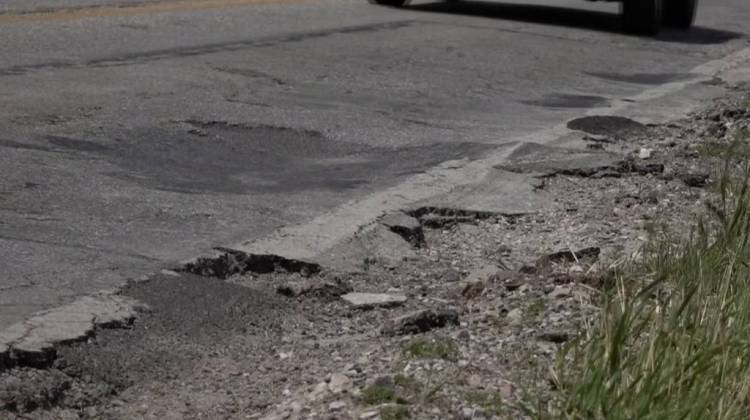This story is part of a three-part series showcasing the candidates for Indiana governor. See the Q&A with Libertarian candidate Rex Bell here, and the Q&A with Democratic candidate John Gregg here.
Eric Holcomb became Indiana’s lieutenant governor about eight months ago. And about three months ago, he replaced Gov. Mike Pence to become the Republican nominee for the Indiana governorship. He says he’s treated each day since like it was a week in a normal campaign.
Indiana Public Broadcasting’s Brandon Smith talked with Holcomb about some of the biggest issues that will face the state’s next governor.
This conversation has been edited for clarity and conciseness:
Brandon Smith: We’ll start with what’s first on really, it seems like, everybody’s mind, which is roads and bridges. So as Hoosiers want to know from the person who wants to be their next governor what’s your plan — Republicans in the House proposed a tax increase, the gas tax increase. Is that something you’d support as governor?
Eric Holcomb: We came out of the last session and we said we’re gonna, as a committee — the Funding Indiana’s Roads for a Stronger, Safer Tomorrow committee as you allude to — we’re going to collect real information, real data and this decision is going to be data-driven. We all agree that we want a long-term, sustainable infrastructure program. We all agreed that we would keep everything on the table.
And I’m anxious about the product that comes out in December from the FIRSST committee and I’ve remained one that has said I’ll honor my commitment: we’ll keep everything on the table and we’ll inventory where we’re at, what our needs are, how much it will cost to address those needs and how much we can afford. And then we’ll figure out the way to actually pay for it.
But what I’m not for, what I’m not for is simply reverting back to those old days where we far outkick our coverage, where we’re just borrowing away the future and leaving it for someone else to pay — where we’re actually paving roads for 20 years but we’re paying for them for 30 years.
Smith: Shifting to education, John Gregg obviously has called for universal pre-K. You, so far, have said, ‘Let’s just expand the existing pilot program.’ What does that expansion look like for you?
Holcomb: You know, we have five counties that Gov. Pence, as you point out, started this pilot program. There were other counties that applied that didn’t make it that have accredited options already on the books, so I’d like to work our way toward meeting that demand.
The children that are the most disadvantaged among us — that’s who I think we need to focus on as we start. And we’ll see the Chamber of Commerce will submit a study, a report I should say, on how this pilot program is working. And I think that data will be incredibly valuable as we continue to expand. I’m all in for pre-K and what does that mean and where do we start and how do we responsibly … certainly by saying it’s universal and by low-balling the cost of it doesn’t get us there.
Smith: If a bill comes to your desk as governor that’s “four words and comma,” simply adding sexual orientation and gender identity to the state’s civil rights code, would you sign it?
Holcomb: You’re giving me a hypothetical, and you’re saying “if.” And nothing that I’ve seen over the last year, in fact the last month, leads me to believe at this time that that will, in fact, happen. And I tend not to focus very much of my time in areas that have a almost zero percent probability of moving forward.
In the future, if there appears to be some progress or movement one way or another, we’ll evaluate it when it moves from a hypothetical to a reality. But this issue has, in the past, been an obviously very divisive issue.
My opponent has spent literally millions of dollars talking about this one issue. I’m going to focus on the things that are going to continue to move this state forward and that’s what I’ve told anyone that’s ever asked me about it.
 DONATE
DONATE








 View More Articles
View More Articles





 Support WFYI. We can't do it without you.
Support WFYI. We can't do it without you.